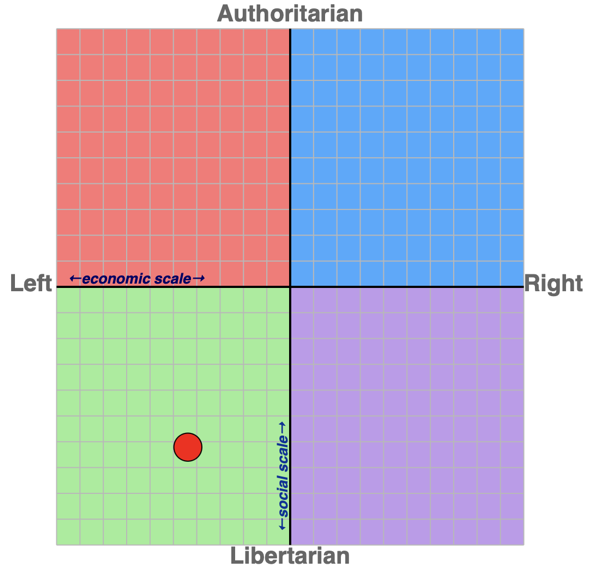
May 5, 2024

I took the Political Compass quiz. No idea how accurate or respected these kinds of quizzes are, but my alignment matches exactly what I expected it would, tending towards the extreme for being socially liberal, tending towards the center for economic conservatism. I know the phrase “social liberal, fiscally conservative” has been co-opted by absolute dickbags, but if you ignore the dogwhistle baggage of the statement and take it literally, I can see that being something I agree with (FWIW, the phrase “common sense” was similarly ruined by Sarah Palin).
Taking this quiz made me realized that these things need a 3rd dimension. We could put far left and far right economists in a room, ask them to fix the American Healthcare system, and they could slowly and painfully hash out a workable solution. There’s a wide range of ways to fix this, from “Medicare for all” on the left to “Obamacare” on the right. The right to left economic scale contains a whole host of reasonable positions.
But! That’s not the discussion we had back in the late-aughts when we were trying to fix healthcare. The argument was not between left and right, but between “let’s fix our healthcare system” and “why fix what isn’t broken?”. The argument was between people who recognized a problem and wanted to solve it, and a coalition that refused to acknowledge the issue at all.
This is the same dynamic Americans see any time there’s economic policy to be made. We aren’t spending our time arguing about the best way to fix homelessness in the richest nation on earth, we’re spending our time arguing about whether homelessness is even a problem. It’s the same with the growing wealth disparity between lower-middle-class Americans and the ultra-rich, astronomical college costs, housing costs, etc. It’s endlessly frustrating.
« The best use for the action button | Home | Weekend Trip to Yosemite »